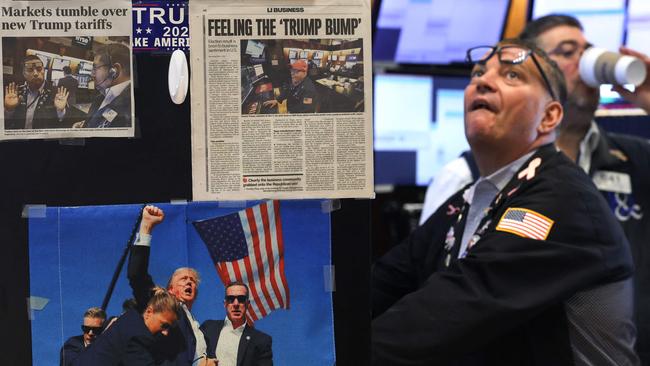
For younger investors who poured their money into bargain hunting this week — the days ahead will be nerve wracking.
For older investors it’s a different story and defensive assets will be top of mind.
After an initial plunge early in the week, traders have been left with no direction to markets whatsoever — the ASX had both its best day and worst day since 2020.
But overall, the markets remain sharply down for the first three months of 2025.
As they say in the trading rooms, “up by the stairs, down by the elevator”.
If RBA governor Michele Bullock has it right, then this tariff war is not the GFC.
But the question is how long will this chaos continue? Are we looking at a Covid-style scare — that is a sharp downturn followed by an equally sharp upturn — or something more painful.
If the mum and dad investors have it right, then it’s a “buy the dip” moment and it will be the biggest win for everyday investors for many years, If big institutional investors who have led the sell off have it right, we could be in for a very difficult period.
One thing many Australian investors — bulls or bears — will probably agree on is the line from former US Federal Reserve chair Janet Yellen describing Trump’s trade tariff plan as “the worst self-inflicted wound that I have ever seen”.
Here’s the six things every investor must know:
Markets will recover
A crisis in the sharemarket scares active investors, a crisis in the bond market scares everyone because it is the heart of the investment market, as anyone who endured the GFC will remember — between 2007 and 2009 the sharemarket fell 50 per cent and it took a decade to recover.
Nobody knows how this will play out. If you have 20 years to go before you retire, why would you change your settings from growth to conservative?
But it you have three years to retirement, then bargain-hunting in wild markets is not ideal if your focus is going to be on maximising income very soon.
Most financial advisers will say markets will eventually recover, so why should a rocky period on the market change your core approach?
But every investor needs to review their setting at times like this.
Bulls will back the bargain hunters, bears will say hoard cash at every opportunity.
With Australian rates almost certainly going to drop, the hunt for income will return for older investors — especially retirees.
No surprise to find bank shares among the most-bought shares this week — that’s because they have fully franked yields of close to 8 per cent.
Time to review?
If you are in a big super fund it’s simple — conservative, balanced or growth.
The test of your investment disposition comes to the fore during sessions like we have just endured — one day the conservatives were the winners, one day the bargain hunters were the winners. This market demands you make up your mind and stick with it.
For active investors, those dilemmas are acute because you have the capacity to move much faster than a big super fund. We are most likely facing whipsaw markets for months — set your sails appropriately.
Be in it to win it
In very volatile markets when “all around are losing their heads”, there are days when a single news item suddenly injects confidence among market traders.
Sometimes it edges on euphoria, as we saw this week when Wall Street jumped by 10 per cent in a single session because Trump appeared to ease his stance on the immediate imposition of tariffs.
Derek Bilney of NAB Private Wealth puts it this way: “There is an opportunity cost of sitting in cash and missing the top 20 highest daily returns over time. The highest returns tend to occur during significant market events such as the 2008-09 global financial crisis and 2020 Covid-19 market downturns.”
Analysis shows many of the best-performing days occur near the worst performing days, making active trading challenging.
For example, at the height of the Covid downturn, the Australian S&P/ASX 200 fell 5.72 per cent on March 23, 2020 as it hit its low, before bounding more than 10 per cent over the following three days.
Stick with the US
The single biggest fund in Australia is the gigantic Australian Super fund — the person who makes the investment decisions for the $367bn operation is chief investment officer Mark Delaney.
In common with most of the big super funds, Delaney has gone “big” on the US market in recent times and has no intention of changing his stance.
In the middle of this week’s pandemonium he said: “It’s very hard to anticipate how events are going to unfold. You are much better to focus on the medium and longer-term drivers … more than half our international flows will continue to go into the US, the rest will be shared around the globe.”
As Sam Wylie of the Melbourne Business School and Windlestone Education group told the Money Puzzle podcast this week: “The biggest mistake in the 20th century was to be underweight US shares, and I think that’s likely to be the biggest mistake in the 21st century, because it’s going to be about tech, and US tech dominance is accelerating and getting deeper rather than the opposite.”
Residential property
There is a strong pattern of Australian investors swinging to the comfort of residential property in times of market crisis — and there is every reason to believe this may happen again in the coming months.
The immediate driver of the residential sector is the expectation interest rate cuts will now be accelerated due to the tariff troubles.

Big bank economists now believe tariff hikes could bring the RBA official rate from near 4 per cent closer to 3 per cent — this means mortgages will drop from around 6 per cent to closer to 5 per cent.
On Friday, NAB backed up the “call” from its in-house economics team that the RBA would do a double cut — i.e. 0.5 per cent — at its next meeting by cutting its one-year fixed mortgage rate from 6.09 per cent to 5.54 per cent.
As The Australian reported this week, sentiment across the residential market has recently improved as clearance rates lifted back to healthy levels of around 70 per cent.
Meanwhile, prices continue to lift at a modest but steady pace. Nationwide residential property prices are up 3.4 per cent over the last 12 months.
Bargain hunters
Australian everyday investors have been taking big bets all week this is not a devastating market blowout similar to the GFC but a Covid crash replay where prices had fully recovered within 14 months after initially falling 30 per cent.
As fund managers sell off their stocks and drive market falls, the internal data from major online brokers showed there was more buying than selling this week on the key platforms such as nabtrade and CommSec.
Director of investor behaviour at nabtrade Gemma Dale says: “There was absolutely more buying than selling — and our platform skews older so you can expect that younger investors may even be bargain hunting more than everyone else.”
Among the most popular stocks bought were BHP, Macquarie Bank, CSL and ANZ, along with exchange-traded funds covering the Australian share market such as VAS Vanguard Australian shares ETF and the iShares S&P 500 (IVV).
This month a key Deutsche Bank report showed big super funds were expanding their exposure to share markets and “steadily reducing their allocation to cash”.
In contrast to big super funds, everyday investors had been building cash and waiting for the drop — once the drop came they pounced.
James Kirby hosts the twice-weekly Money Puzzle podcast






Everyday Australian investors have made a huge gamble this week that the sharemarket will soon stage a rapid rebound. But it’s going to be a rocky ride.